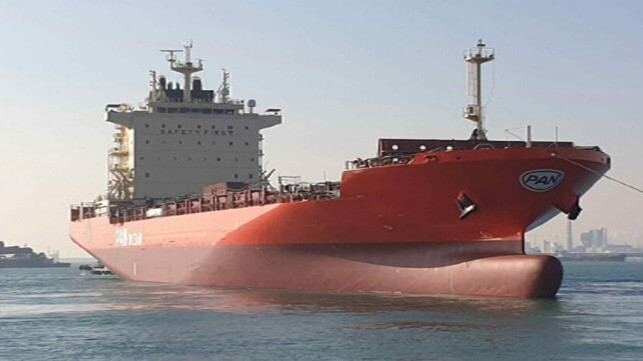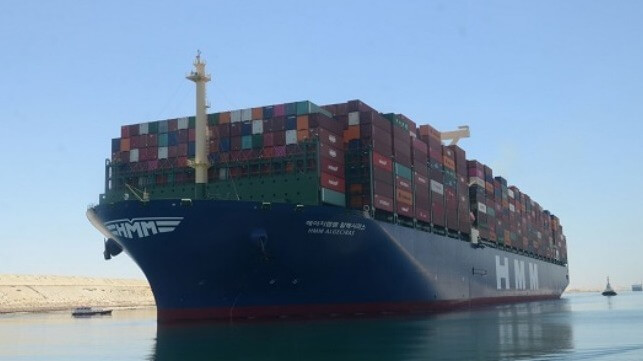Korea Launches First Containership Built for Autonomous Operations

South Korea today launched a new containership which is set to achieve new milestones in the efforts to develop autonomous shipping. The country’s Ministry of Oceans and Fisheries is highlighting the vessel as the first large, ocean-going ship designed for Level 3 autonomous shipping and they plan to launch the first long-distance international demonstrations of autonomous shipping with this vessel later this year.
At today’s ceremony shipbuilder Hyundai Mipo Dockyard in Ulsan, South Korea marked the float out and naming of the vessel. She is the Pos Singapore built for Pan Ocean. Ordered in 2022, the vessel is 564 feet (172 meters) in length with a capacity of 1,800 TEU. Registered in Liberia, the 22,200 dwt containership is scheduled to be delivered at the end of this month and then will begin outfitting and testing the autonomous system.
The South Korean government highlights that it has designated autonomous vessels as a core initiative in its Advanced Maritime Mobility Development Strategy announced in November 2023. This project for autonomous shipping was launched in 2020 with the government committing more than $120 million for the research and development of the technology.
A public-private partnership was launched with shipbuilding and shipping along with the technology industry. According to the ministry, this system is designed to achieve IMO Level 3, meaning the ship can operate autonomously without crew onboard. Operations will be conducted fully by remote control.
From the design stage of the containership, Pan Ocean and Hyundai Mipo completed preliminary preparations to install the autonomous navigation system, which will now be installed. The system integrates autonomous navigation, digital-based agency monitoring, communication, and security technology.
The Korean industry has been testing a range of autonomous systems over the past few years. In 2022, Hyundai conducted what was called the world’s first transoceanic voyage of a large merchant ship employing autonomous navigation technologies. The system was fitted aboard a 97,500 dwt LNG carrier and undertook a more than 11,000 nautical mile crossing of the Pacific.
Demonstrations of the latest version of the technology started in 2023 aboard a smaller, domestic ship, Ocean Nuri (69 tons). The plan calls for the Pos Singapore to undertake its first demonstrations on an international route beginning in September 2024.
South Korea Takes Down “For Sale” Sign on HMM

Efforts to privatize South Korean shipping company HMM have been put on hold indefinitely after the collapse of negotiations to sell a controlling stake to the Harim Group, the parent company of Korean dry bulk shipping company Pan Ocean. The country’s two state-controlled financial institutions had been looking for years to return the shipping company to private hands after the government-led bailout rescued the former Hyundai Merchant Marine and recapitalized the company into HMM.
“We have no plan to restart sales of HMM for now,” South Korea’s Oceans Minister Kang Do-hyung told reporters at a conference on Thursday ending weeks of speculation on the government’s plans. He told the reporters, “As the company is injected with the state fund, we plan to set plans so that it can be operated soundly.”
The price of the company’s stock was down by 0.35 percent on Friday after the government clarified its position. Harim had been selected in partnership with Korean private investment firm JKL Partners as the winning bidder in December with an offer valued at approximately $4.9 billion to take a 58 percent stake in the company. Negotiations to finalize the deal became stuck on issues of management control, board representation, and the plans for the government to sell its remaining stake in the shipping company.
After the negotiations collapsed, an official at the state-run Korea Development Bank told the Korean JoonAng Daily that the next steps were uncertain. They said they would be holding discussions with the other large shareholder, Korean Ocean Business Corporation, but it was also reported that Korea’s Ministry of Oceans and Fisheries was reluctant to proceed with the sale process. Reports said there were calls for “prudence” in setting the strategy.
KDB had been reported to be exploring the privatization for at least two years before launching the process in 2023. Officials of the bank questioned the use of public funds to finance the shipping company pointing out that HMM finally became profitable in 2020 after years of losses. In 2023, they formed an advisory group with investment bankers and consultants and launched the bidding process, but there were questions over the timing as the container market was declining.
Media reports speculated that there was disappointment last year when none of Korea’s large conglomerates came forward as bidders. It ultimately came down to a head-to-head battle between two midsized groups, Harim and food and logistics company Dongwon Group. KDB and KOBC rejected an expression of interest from Hapag-Lloyd saying that ownership of HMM should remain in Korea while SM Line failed to enter a bid saying the valuation of HMM was too high. Another smaller South Korean conglomerate, LX Holdings, had also qualified to bid but did not proceed.
There had been speculation that the financial institutions might attempt to approach Dongwon or negotiate another sale. HMM has mapped out a strategy and continues to move forward looking both to expand its container operations and diversify by growing operations in dry bulk and tankers. The company ordered new heavy-lift vessels and its first car carriers. There had also been speculation that it might attempt to purchase its former LNG shipping company which was sold off during the recapitalization.
No comments:
Post a Comment